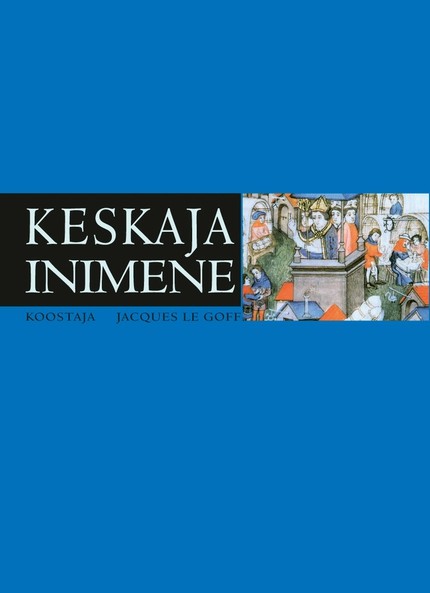Электронная книга: Jacques Le Goff «Keskaja inimene»

|
Kuidas elasid inimesed keskajal? Milline oli nende mõtteviis? Mille poole nad püüdlesid? Millest leidsid nad õnne ja kindlust? Kuidas nad omavahel läbi käisid? Neile küsimustele võib leida vastuse raamatust „Keskaja inimene". Teos on teine raamat Euroopas laialdast tähelepanu pälvinud sarjast, mis käsitleb inimest ajaloo erinevatel epohhidel. Rahvusvaheliselt tunnustatud medievistid kirjeldavad inimesi, inimgruppe ja kogukondi, kes mängisid keskajal määravat rolli ja esitavad nii värvika ja informatiivse läbilõike selle epohhi ühiskonnast, tavadest ja argipäevast. Raamat on mõeldud kõigile ajaloohuvilistele, ent seda võib kasutada lisamaterjalina ka gümnaasiumis. Sisukord: Eessõna (J. Le Goff), Munk (G. Miccoli), Sõdalane ja rüütel (F. Cardini), Talupoeg (G. Cherubini), Linlane (J. Rossiaud), Intellektuaal (M. F. B. Brocchieri), Kunstnik (E. Castelnuovo), Kaupmees (A. Gurevitš), Naine ja perekond (C. Klapisch-Zuber), Pühak (A. Vauchez), Väljaspool seisja (B. Geremek). Издательство: "Eesti digiraamatute keskus OU"
ISBN: 9789985222188 электронная книга Купить за 984.62 руб и скачать на Litres |
Другие книги автора:
| Книга | Описание | Год | Цена | Тип книги |
|---|---|---|---|---|
| La Vieja Europa y El Mundo Moderno | — Alianza, - Подробнее... | бумажная книга |
Jacques Le Goff
Jacques Le Goff (born
Le Goff champions the
Life
A prolific medievalist of international renown, Le Goff is the principal heir and continuator of the movement known as
Since then he has dedicated himself to studies on the historical
In his 1984 book "The Birth of Purgatory" he argued that the conception of
An agnostic, Le Goff presents an
Among his recent works are two widely accepted biographies, a
In 2004 Le Goff received the
elected bibliography
Works
*"Time, Work, & Culture in the Middle Ages", translated by
*"Constructing the Past: Essays in Historical Methodology", edited by Jacques Le Goff and Pierre Nora. (Cambridge: Cambridge University Press, 1985)
*"The Medieval Imagination", translated by Arthur Goldhammer. (Chicago & London: University of Chicago Press, 1988)
*"Your Money or Your Life: Economy and Religion in the Middle Ages", translated by Patricia Ranum. (New York : Zone Books, 1988)
*"Medieval Civilization, 400-1500", translated by Julia Barrow. (Oxford: Blackwell, 1988)
*"The Medieval World", edited by Jacques Le Goff, translated by Lydia G. Cochrane. (London: Parkgate, 1990)
*"The Birth of Purgatory", translated by Arthur Goldhammer. (Aldershot: Scolar Press, 1990)
*"History and Memory", translated by Steven Rendall and Elizabeth Claman. (New York: Columbia University Press, 1992)
*"Intellectuals in the Middle Ages", translated by Teresa Lavender Fagan. (Oxford: Blackwell, 1993)
*"Saint Louis" (Paris: Gallimard, 1996)
*"Saint Francis of Assisi", trans. Christine Rhone (London: Routledge, 2003)
*"The Birth of Europe", translated by Janet Lloyd. (Oxford: Blackwell, 2005)
Notes
References
*Miri Rubin, ed. "The Work of Jacques Le Goff and the Challenges of Medieval History" (Cambridge: Boydell, 1997)
External links
* [http://www.dandavidprize.com/laureates/past2007-legoff.html Dan David Prize] , Dan David Prize laureate 2007
* [http://www.france.diplomatie.fr/label_france/ENGLISH/IDEES/LE_GOFF/le_goff.html Did St Louis really exist?]
* [http://www.eurozine.com/article/2003-09-05-goff-en.html The history of innovation and revolt]
* [http://legoff.provincia.parma.it/ Il Medioevo Europeo di Jacques Le Goff]
Источник: Jacques Le Goff
См. также в других словарях:
Ilmar Talve — Ilmar Talve, 2004 Ilmar Talve (* 17. Januar 1919 in Mga, damals Gouvernement Petrograd, Sowjetrussland; † 21. April 2007 im Turku, Finnland) war ein estnischer Schriftsteller, Literaturwissenschafter und Ethnogra … Deutsch Wikipedia
